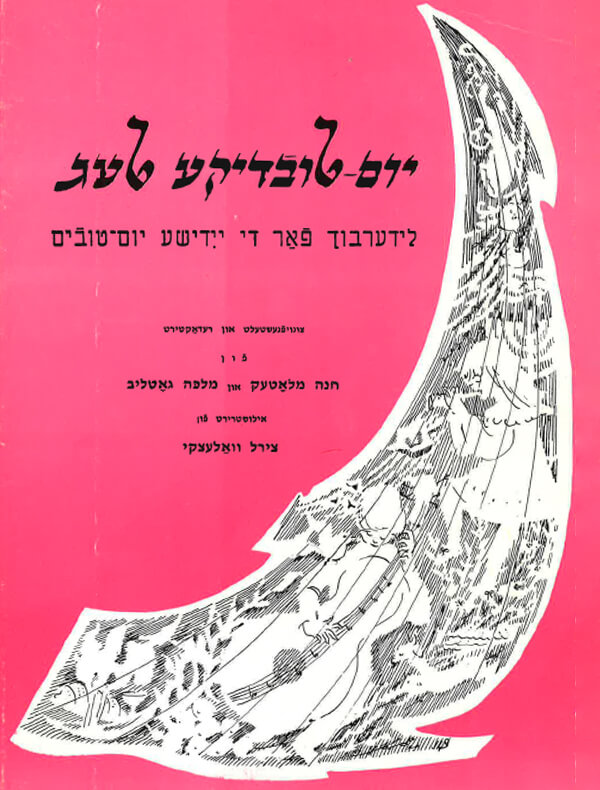
Tell me, Marrano, my brother,
where your Seder is prepared?
In a deep cave, in a chamber
I have prepared my Seder there.
Tell me, Marrano, where, from whom
will you get white matsos?
In the cave, by God’s mercy
my wife has kneaded the dough.
Tell me, Marrano, can you figure out how
to get a Hagode somewhere?
In a deep crack in the cave
I have long hidden it.
Tell me, Marrano, what will become of you
if your voice is detected?
If the enemy captures me,
then I will die singing.
Zog, maran, du bruder mayner,
Vu iz greyt der seyder dayner?
—In tifer heyl, in a kheyder
Dort hob ikh gegreyt mayn seyder
Zog, maran, mir, vu, bay vemen
Vestu vayse matses nemen?
— In der heyl, af gots barotn,
Hot mayn vayb dem teyg geknotn.
Zog, maran, vi vest zikh klign,
A hagode vu tsu krign,
— In der heyl, in tife shpaltn,
Hob ikh zi shoyn lang bahaltn.
Zog, maran, vi vest zikh vern,
Ven men vet dayn kol derhern?
— Ven der soyne vet mikh fangen,
Vel ikh shtarbn mit gezangen.
זאָג, מאַראַן, דו ברודער מײַנער,
װוּ איז גרײט דער סדר דײַנער?
— אין טיפֿער הײל, אין אַ חדר,
דאָרט האָב איך געגרײט מײַן סדר.
זאָג, מאַראַן, מיר, װוּ, בײַ װעמען
װעסטו װײַסע מצות נעמען?
— אין דער הײל, אױף גאָטס באַראָטן,
האָט מײַן װײַב דעם טײג געקנאָטן.
זאָג, מאַראַן, װי װעסטו זיך קליגן
אַ הגדה װוּ צו קריגן?
— אין דער הײל, אין טיפֿע שפּאַלטן
האָב איך זי שױן לאַנג באַהאַלט.
זאָג, מאַראַן, װי װעסט זיך װערן,
װען מען װעט דײַן קול דערהערן?
— װען דער שׂונא װעט מיך פֿאַנגען,
װעל איך שטאַרבן מיט געזאַנגען.
Song Title: Zog, Maran

Written by Chana Mlotek and her sister Malke Gottleib, Yontefdike Teg, a holiday songbook, was originally dedicated to Aaron Fishman, a beloved Yiddish educator, whose devotion to Yiddish culture inspired countless students who went on to become leaders in education and the arts. Because of Aaron Fishman’s long-term loyalty to the Yiddish shules (schools), the Yontefdike Teg collection was designed to serve the Yiddish shule and also to be an integral part of the Jewish home. The songs were chosen from material that was used in various types of Yiddish shules. Some of the songs even stem from the very beginning of the modern Yiddish shule in Europe and in America. In the collection, remarkable material can also be found, such as: songs sung in the Yiddish shules in Argentina; revived folksongs; adaptations from Avrom Goldfaden melodies; and new original music. The forty songs were chosen on the basis of first-hand experience of teaching Yiddish songs to children in the Yiddish shules and intentionally selected to be easily memorized and give great joy in singing.
The selection of the songs in this collection reflects the teaching practice in the modern Yiddish shule. There are more songs for the holidays of Chanukah, Purim and Pesach than for other holidays, largely because people are more likely to devote themselves to these holidays than to the others. Some songs represented a special significance for the editors. For example, the charming Khatsi-halayla (In the middle of the night) was chosen by the Arbeter Ring shules in Philadelphia, with which Aaron Fishman had close ties for many years. A second song, Shavuos, for which Aaron Bromberg (עייה), another teacher, had written the lyrics, has become a Chassidic tune that was taught by Leibush Lehrer, someone who had a very great universal influence. A notable innovation in this collection is that the songs are published in Yiddish, together with an English transliteration and an English summary for each song. Both the Yiddish and English transliterations conform to YIVO usage, the highest academic Yiddish language authority. The music is set in keys that are not difficult for young voices and that young fingers can easily play on the piano.
Those who have undertaken responsibility in the preparation of this collection are all active practitioners of Yiddish training, music and art. In addition, they all possess another underlying commonality: all were born in the United States, graduates of the Yiddish shules where, in several instances, they learned to sing the songs for the first time. They have all continued their interest and enthusiasm for the Yiddish shule. Not only have Yiddish songs enriched their private lives, but through these Yiddish songs, friends and family have developed love and respect for Yiddish music and Yiddish cultural works. In the original introduction, Mlotek and Gottleib write: It is our hope and aim that for Jewish children and their parents, the Jewish holidays in the shule and in the home will always be accompanied by Yiddish song and that Yiddish song will always help fortify the Jewish home and the Jewish holidays.